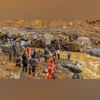As Kerala grapples with the aftermath of the tragedy in Wayanad and rescuers continue to sift through the debris, a political slugfest has erupted after Union Home Minister Amit Shah said the Kerala government was given advance warnings of heavy rainfall in the state.
Soon after, former chairman of the Western Ghats Ecology Expert Panel, Madhav Gadgil, termed the disaster in Wayanad a “man-made tragedy”. He attributed it to the Kerala government’s failure to implement essential ecological recommendations.
Appointed by the Ministry of Environment, Forest and Climate Change, the Western Ghats Ecology Expert Panel was established in 2010 to develop conversation strategies for the Western Ghats. It was headed by ecologist Madhav Gadgil.
Gadgil-led expert panel submitted its report in 2011 and recommended that the entire Western Ghats be designated as an “ecologically sensitive area”. It divided the region into three zones – ESZ-1, ESZ-2 and ESZ-3, based on geographical sensitivity and proposed strict regulations regarding construction and developmental works in the region. It also recommended a complete ban on the transfer of forest land for non-forest purposes in the ESZ-1 area.
However, due to the resistance from local people, these recommendations could never be implemented. Speaking to The Hindu after the disaster in Wayanad, Gadgil said the Kerala government did not adhere to the panel’s proposals to prevent such disasters.
According to a reply by the Ministry of Earth Sciences in Lok Sabha, between 2014 and 2020, Kerala alone experienced around 61.21 per cent of the 3,656 landslides in the country.
Proposals met local resistance
More From This Section
Another high-level working group led by K Kasturirangan was formed in 2013. The committee proposed 37 per cent of Western Ghats as ‘Eco-sensitive areas’. It also asked for a blanket ban on certain activities such as mining, quarrying and thermal power projects.
Again, due to popular protests, the committee’s recommendations have not been implemented yet. The Karnataka government is also of the opinion that declaring Western Ghats as eco-sensitive would adversely affect the livelihood of people in the region.
These committees are often accused by local peoples as “too environment friendly”, and completely “ignorant” of local needs.
Eco-sensitive region
Kerala forms a part of the Western Ghats that is considered the ‘protector’ of the Indian peninsula. Its rich biodiversity is nourished by moderate tropical temperatures along the coast of Arabian Sea, and a good amount of rainfall.
But in recent years, the Arabian Sea often deviated from its calm nature under the influence of increasing cyclones. Since 2019, the region experienced four major storms: Cyclone Vayu (2019), Nisarga (2020), Tauktae (2021), and Biporjoy (2023). A report from Down to Earth indicates that the frequency of intense tropical cyclones in the Arabian Sea is expected to increase by 2050.
Ecologists believe this might be the key reason why Kerala is in the grip of frequent natural disasters, starting from the devastating floods of 2018 that killed over 400 people, to recent landslides in Wayanad.

)